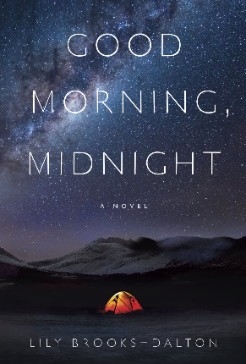When the sun finally returned to the Arctic Circle and stained the gray sky with blazing streaks of pink, Augustine was outside, waiting. He hadn’t felt natural light on his face in months. The rosy glow spilled over the horizon and seeped into the icy blue of the tundra, casting indigo shadows across the snow. The dawn climbed like a wall of hungry fire, delicate pink deepening to orange, then crimson, consuming the thick layers of cloud one at a time until the entire sky was burning. He basked in its muted glow, his skin tingling.
The overcast sky was unusual for the spring season. The observatory’s site had been chosen for its clear weather, the thin polar atmosphere, and the elevation of the Cordillera Mountains. Augie left the concrete steps of the observatory and followed the path carved into the steep slope of the mountain—down to the cluster of outbuildings nestled against the mountain’s incline, then beyond them. By the time he’d passed the last outbuilding the sun had already begun to sink, the color to fade. The day had come and gone in ten minutes—less, perhaps. Snow-covered peaks rolled all the way to the northern horizon. To the south, the low, smooth expanse of the tundra flowed into the distance. On his best days the blank canvas of the landscape set him at ease; on his worst he contemplated madness. The land did not care for him and there was nowhere else to go. He wasn’t sure yet which sort of day today was.
In a different life he used to pack his soft leather suitcase whenever his environment rejected him, as it often did, and find another place to go. It wasn’t even a very large suitcase, but it contained the essentials of his existence neatly, with a little room to spare. There was never a need for moving trucks, or bubble wrap, or farewell parties. When he decided to go, he was gone within the week. From a postgraduate fellowship in the Atacama Desert of northern Chile where he cut his teeth on dying stars, to South Africa, Puerto Rico, Hawaii, New Mexico, Australia—following the most advanced telescopes, the biggest satellite arrays, like bread crumbs scattered across the globe. The less earthly interference there was, the better. It had always been this way for Augustine.
Continents and countries meant nothing to him; it was only the sky that moved him, the happenings on the other side of the atmospheric window. His work ethic was strong, his ego engorged, his results groundbreaking, but he wasn’t satisfied. He had never been satisfied and never would be. It wasn’t success he craved, or even fame, it was history: he wanted to crack the universe open like a ripe watermelon, to arrange the mess of pulpy seeds before his dumbfounded colleagues. He wanted to take the dripping red fruit in his hands and quantify the guts of infinity, to look back into the dawn of time and glimpse the very beginning. He wanted to be remembered.
Yet here he was, seventy-eight years old, at the top of the Arctic archipelago, on the rind of civilization—and, having come to the terminus of his life’s work, all he could do was stare into the bleak face of his own ignorance.
